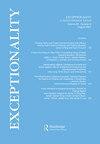“If We Could Just Sit down and Talk”: Fathers’ Partnerships with Educational Professionals
IF 0.9
4区 教育学
Q4 EDUCATION, SPECIAL
引用次数: 0
Abstract
ABSTRACT Family-professional partnerships are an important predictor of student success for children with and without disabilities. However, little is known about the perspectives of fathers of children with complex disabilities regarding their partnerships with educational professionals. This study presents findings from semi-structured interviews with 15 fathers of children with complex disabilities regarding their partnerships with professionals. Fathers described both challenging and collaborative interactions with the educational professionals working with their children. In challenging interactions, fathers described educational professionals focused on the monetary costs of their child’s educational needs, a struggle to find schools and programs that fit their child’s needs, and educators who were inflexible and unwilling to implement individualized instructional strategies. More positive and collaborative father-professional partnerships were characterized by authentic relationships that responded to the expertise of parents, as well as educators who were flexible and strengths-based in their practice. Fathers offered guidance for how educators could strengthen partnerships with fathers. Findings from this study extend the very limited research on the school involvement experiences of fathers of children with complex disabilities by identifying specific characteristics of positive and negative family-professional interactions for these fathers and highlighting avenues for change in professional practice to strengthen fathers’ school involvement experiences.“如果我们能坐下来谈谈”:父亲与教育专业人士的伙伴关系
家庭-专业伙伴关系是残疾儿童和非残疾儿童学习成功的重要预测因素。然而,对于复杂残疾儿童的父亲如何看待他们与教育专业人员的伙伴关系,人们所知甚少。本研究通过对15位患有复杂残疾儿童的父亲进行半结构化访谈,了解他们与专业人士的合作关系。父亲们描述了与与他们孩子一起工作的教育专业人员之间具有挑战性和合作性的互动。在具有挑战性的互动中,父亲们描述了教育专业人员专注于孩子教育需求的金钱成本,努力寻找适合孩子需求的学校和项目,以及缺乏灵活性和不愿实施个性化教学策略的教育工作者。更积极和合作的父亲-职业伙伴关系的特点是真实的关系,这种关系回应了父母的专业知识,以及在实践中灵活和基于优势的教育工作者。父亲们为教育工作者如何加强与父亲的伙伴关系提供了指导。本研究的发现通过确定这些父亲的积极和消极家庭-职业互动的具体特征,并强调了在专业实践中改变的途径,以加强父亲的学校参与经验,扩展了对复杂残疾儿童父亲的学校参与经验的非常有限的研究。
本文章由计算机程序翻译,如有差异,请以英文原文为准。
求助全文
约1分钟内获得全文
求助全文

 求助内容:
求助内容: 应助结果提醒方式:
应助结果提醒方式:


